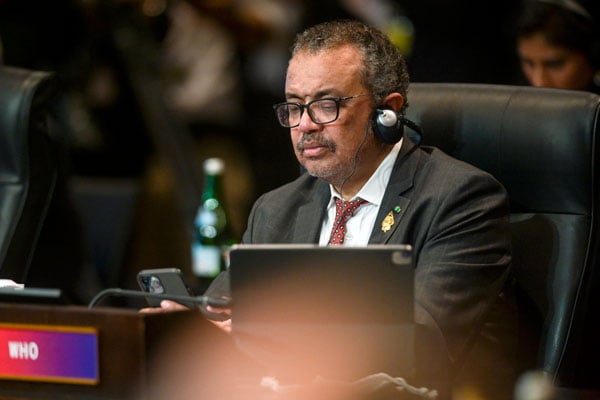Three candidate vaccines against the strain of Ebola wreaking havoc in Uganda will be shipped into the country next week for trials, the World Health Organization (WHO) said Wednesday.
Since Uganda declared an Ebola outbreak on September 20, cases have spread across the country, including to the capital Kampala, and have claimed 55 lives, with 22 more believed to have died before their samples were tested.
Uganda has been struggling to rein in the outbreak caused by the Sudan strain of the virus, for which there is currently no vaccine. But UN health agency chief Tedros Adhanom Ghebreyesus told reporters that vaccine trials would soon begin.
Speaking from the G20 summit in Indonesia, Tedros said a WHO committee of external experts had evaluated candidate vaccines and determined “all three should be included in the planned trial in Uganda”.
The WHO and the Ugandan health ministry accepted the committee’s recommendation, he said, adding: “We expect the first doses of vaccine to be shipped to Uganda next week.”
The WHO hailed the “incredibly fast collaboration” to reach this point.
“Since the outbreak began, the government of Uganda, together with researchers, funders, companies, regulatory authorities and other experts have been working under a global effort coordinated by WHO to accelerate the development and deployment of vaccines for use in trials,” Tedros pointed out.
The candidates include a vaccine developed by Oxford University and the Jenner Institute in Britain, and another from the Sabin Vaccine Institute in the United States.
The third candidate came through the International AIDS Vaccine Initiative (IAVI), WHO said.
They will be used in a so-called ring vaccination trial, where all contacts of confirmed Ebola patients, and contacts of contacts are jabbed along with frontline and health workers.
“We have received written confirmation from the developers that sufficient vaccines and sufficient number of doses will be available for the clinical trial, and beyond if necessary,” Ana Maria Henao Restrepo, one of WHO’s heads of research and development, told reporters.
There is meanwhile concern that progress being made to slow the spread of Ebola even without the jabs could complicate the planned trials.
Such trials can only be run when there is fairly rapid transmission underway of Ebola, a haemorrhagic fever that spreads through close contact with bodily fluids and that is often deadly.
“We have uncertainty… about the evolution of the outbreak,” Henao Restrepo said, acknowledging that it remained unclear “how many rings can be formed as part of the trial.”
But she stressed that all those involved were committed to pushing ahead with randomised trials in a bid to “generate robust evidence that will allow us to know if one or more of them has the efficacy we hope they have.”








